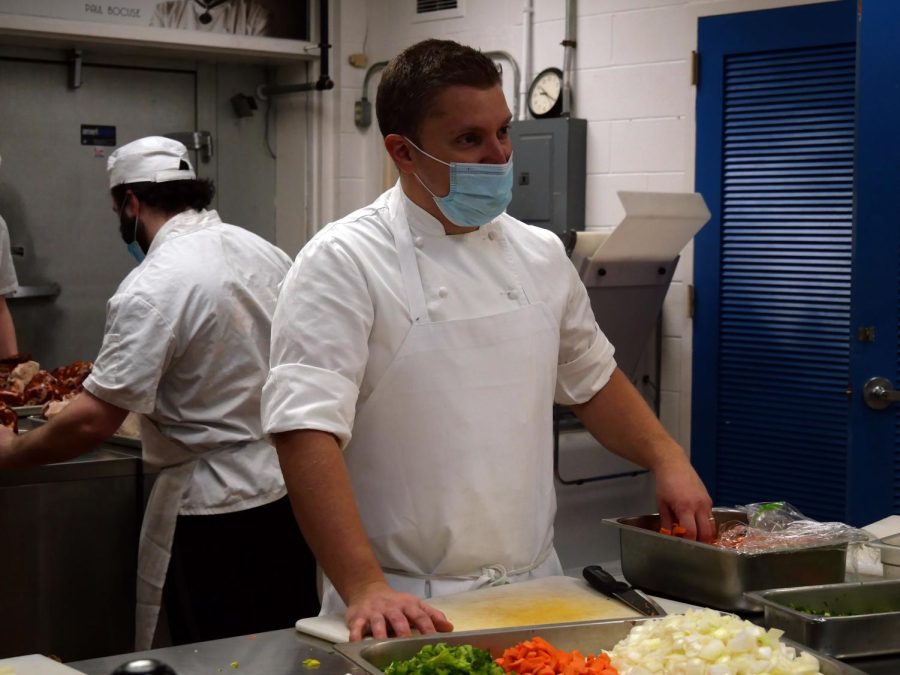Holiday Baking Champion: Adam Monette
Chef Adam Monette in the kitchen at the Northwest Career and Technical Center. Photo credit: Asher Ballantine
January 16, 2022
After receiving a DM (Direct Message) on Instagram from head hunters who scour the internet looking for participants for the Food Network, Adam Monette, culinary instructor at the Northwest Career and Technical Center, was wary about the authenticity of the message. That is until a former student, Tyler Como (’16), who recommended Monette to the Food Network, confirmed that the offer to compete in the championship was the real deal.
“I had to audition. The audition part was a couple meetings on Zoom with the producers, and they’re getting a feel for your personality, and how you answer questions. They’re kind of sizing you up. There was another audition where I had to bake something…keep in mind there are thousands of people [auditioning] for the show,” Monette said.
Monette didn’t hear back for weeks whether he made it to the show or not, until he received a call one week before filming confirming his acceptance to participate.
“At that point I had a job lined up. I was going to work at Shore Acres,” Monette said.
Nearly all other contestants had a similar dilemma of choosing to take time off of work and losing a paycheck or staying home to keep it. The Food Network doesn’t compensate contestants while filming, so it can be a huge risk for small business owners, or other workers, to shut down their shop for the opportunity of exposure and winning the $25,000 prize.
On Father’s Day, Monette packed up and flew out to the filming location in Tennessee. For two and a half weeks, Monette and fellow contestants would get up at 5 a.m. each day to get COVID tests before heading to the production studio. After waiting in an empty room, audio workers would mic up the contestants and then the makeup team would touch up everybody.
“You’re looking at a set that looks like a theatre class. It’s a set, but when you go into it, the illusion is so real. It’s like a 1×2 construction and on TV it looks like a kitchen, but it’s a set… There’s no plumbing [so] the water is dumped into these huge recycle bins. When you need access to water, it’s not plumbed that way, there’s no drainage… It’s a room inside a room,” Monette said.
The more difficult aspects of competing was dealing with the time limits and the different challenges. In order to eliminate competitors, the challenges are designed to trip up contestants either on the taste or presentation aspect of the baked good.
In response to which was more important, the presentation or the taste, Monette said “I felt like it changed depending on the challenge, like the bread challenge was all about aesthetics…we don’t see the deliberation between the judges…it was like a moving target [for each challenge]. It’s not a 50/50 thing. It’s about how creative you can be in non-traditional ways.”
The kitchen environment provided opportunities for contestants to be creative. Before filming, contestants were able to look at the pantry for 5 minutes to note what ingredients were available, and those ingredients were extensive.
“It’s like this pressure cooker where you have this freedom to be creative because you have all these things at your disposal,” Monette said.
Comparison to other bakers was difficult because contestants weren’t permitted to taste another’s baked good or see the judges’ reaction to somebody else. That blind eye to how other contestants were performing made it easier to focus on oneself.
“I was only concerned about myself. I only worried about what I was doing, [and] everybody is wearing a poker face. Most times, the individual is the harshest critic, [so if somebody said] ‘I did rubbish, I’m going home’ [then the judges would reveal that] ‘you won!’ Watching the show back was the first time I got to see what others were doing,” Monette said.
The experience of getting to know the other contestants first before watching the show was interesting for Monette. Every contestant was there for a reason, but the challenges are what lead to many of them going home empty handed.
“If you got the wrong challenge, like if it wasn’t in your wheelhouse or you just made a misstep, that’s all it t[ook to go home],” Monette said.
After hearing the announcement of his winnings, Monette was surprised and emotional. The overall experience for Monette was out of the ordinary because of the level of feedback received after each challenge and having to continue to use that feedback and perform every day. After two weeks of long filming days and constant challenges, Monette was tired and ready to head home to see his family.
“I was emotional and super happy and grateful I was able to do it. I was catching a lot of feelings that day,” Monette said.


Louise May Thompson • Jan 16, 2022 at 8:24 pm
I followed Adam Monette on the Holiday Baking Championship show, so I really enjoyed reading your article. You certainly had an extensive interview with Mr.Monette because you wrote about so many of the different challenges that he faced during the competition. Thank you for writing this informative article.